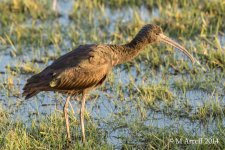As someone who is still very much a novice birder I find it helpful when people give information such as time/location. That way I get to learn what the bird looks like in flight/hunting/roosting etc which gives me confidence to identify it when I see it elsewhere.
Welcome to Birdforum stuarta21, many times I envy people who are just starting out on their birding careers, you have many great experiences and finds ahead of you, enjoy, for what it is worth here are a few tips:-
1. Start right at the beginning, look at some very obvious birds, Great Crested Grebe, Green Woodpeckers and Kestrels - acquaint yourself with these birds fully.
2. Buy some field guides - this one is very good by Lars Johnsson called Birds of wood, park and garden, very naturalistic illustrations. If you can't get that get the new Helm guide of confusion species. When you get home from a good days birding pour over these birds and try to absorb as much information as possible.
3. If you can draw, buy some tracing paper and draw some of these birds, try to work out the different parts of the birds without finding out their names - start with head, tail, beak etc, work out how the bird can fly using its different feathers, stick the tracing up around your home and office, look at them everyday, imagine the excitement of seeing these birds in the field.
4. Call Birdline 09068700245 once a day in the evening, plan your day according to what you want to see, on many days there just won't be much about, so go to places that you really like. Don't call Birdline just before going out birding in the morning, there won't be many updates - you'll just be wasting your money!
5. When you arrive at a particular site, be in a state delirious excitement that you literally have to race to the sightings board, be careful though these sighting sometimes show all the birds that have occurred in the last week, so the chances are you will only see about 1/5 of the birds reported.
6. You will find that just by turning up at sites eventually an absolutely corking rarity will have turned up and there will be birders around to guide you through its ID. I'm afraid it will be about 30 years before you find your own rarity - but it will be worth the wait!
7. Try to appreciate common birds, I know you probably want to see all the rare stuff but if you don't now you will have to wait another 20 years before you realise the common stuff is what it is all about.
8. There is a really good magazine called Twitching, you can find this is some shops selling bird books but many experienced birders will have back copies - you may have to haggle!
9. Join the RSPB, for the youngsters there is the YOC and look out for a great cartoon called Rook, (I'm not sure its still going though), some of the trip reports are mouthwatering.
10. You will see lots of birders these days carrying very expensive binoculars, you don't have to splash out massively if all - try out every binocular and find the one that suits you - a 250 quid pair of second hand Zeiss West will do nicely.
11. Obviously you can't afford a camera at the moment, but rest assured photographing birds is very difficult! There are only one or two decent photographers about - their photos are split into three categories 'excellent', 'good' and 'record'
So that's about it - be humble, realise that there is a wealth of knowledge that will take a lifetime to learn and have fun!





